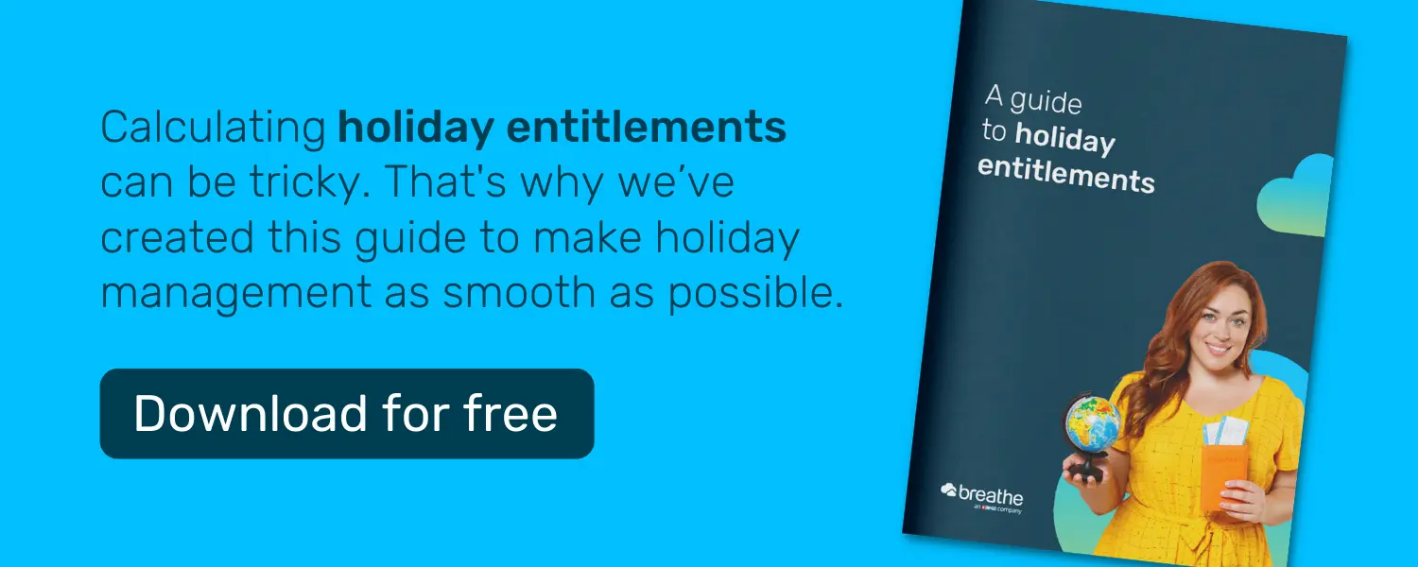How familiar are you with an employee’s rights to take holiday during their notice period? If you have a small team and short notice period, it’s important to get to grips with the topic.
Managing holiday during notice periods can be complex, especially when dealing with many employees leaving their job at the same time.
Employees who hand in their notice and intend to use all remaining holiday can unintentionally disrupt business for you and the rest of the team, potentially affecting the job responsibilities of remaining staff.
As their employer, you need be transparent with your departing employee and tell them what holiday they are entitled to during their notice period.
It's also important to review employment contracts, as these contracts often set out the procedures and rights for both employers and employees regarding holiday during the notice period.
In this article we share the detail behind holiday entitlements after giving notice.
Understanding the notice period for leave
Can an employee take holiday during their notice period?
Can employers refuse leave requests?
Can an employer make an employee use all remaining holiday entitlement during their notice period?
Consequences of exceeding your leave
What happens if an employee takes more leave than they've accrued?
Can I pay an employee in lieu of holiday during their notice period?
How do I calculate holiday pay for an employee who is leaving?
Restrictions on leave during peak periods
Understanding the notice period for leave
If someone wants to take time off during their notice period, they still need to follow the usual rules when it comes to giving notice. Legally, they should give notice that’s at least twice as long as the holiday they’re asking for. This is known as statutory notice.
However, some contracts may specify a longer period, known as contractual notice, which can exceed the statutory minimum. Both statutory notice and contractual notice may apply when requesting holiday during a notice period, so it's important to check which one is relevant. So, if they want to take 3 days off, they’d need to give at least 6 days’ notice.
In most UK organisations, notice periods are longer than the legal minimum. Surveys suggest only around 10% of employers stick to the statutory minimum, most opt for one‑month or more, especially for managerial roles.
Notice periods commonly fall into 1‑month, 3‑month, or even 6‑month tiers depending on seniority or specialist roles. Providing the right notice is essential for both employees and employers to ensure holiday requests are valid and comply with both legal and contractual requirements.
With this in mind, when someone has a short notice period, employers should double-check there’s truly enough time left for them to give proper holiday notice and take the time off before leaving.
If employers require employees to take holiday during the notice period, they must give advance notice that is at least twice the length of the holiday to comply with legal requirements.
That said, employers don’t have to approve every leave request, especially if it’s short notice or clashes with business needs. On the flip side, employers can also ask someone to take some (or all) of their remaining holiday before they leave, as long as they give the right amount of notice too.
It’s always worth checking the contract or your holiday policy for any extra details, but this is the general rule of thumb under UK law.
Can an employee take holiday during their notice period?
Yes. An employee may request to take whatever is left of their statutory annual leave holiday request. Employees are entitled to at least their statutory holiday entitlement, which is the legal minimum amount of paid holiday. Depending on their employment contract, they may also have additional contractual holiday beyond the statutory entitlement.
But it’s how much holiday they’ve accrued each month that matters. And this depends on how much of the holiday year has passed. For example, they won’t be able to use a full years’ worth of allowance if the holiday year only started 3 months ago.
An employee’s holiday entitlement begins to accrue from their first day of employment and accrues each month in relation to their annual leave entitlement.
For example, if your holiday year runs from January to December and the employee leaves in April, they will have accrued 4/12ths of their holiday entitlement. Based on an annual leave allowance of 25 days, this means they're entitled to have taken 8.3 days of holiday.
This means they can take up to 8.3 days of time off. If the employee has leftover contractual holiday in addition to their statutory holiday entitlement, this should also be included when calculating their remaining leave.
An easy way of calculating an employee’s remaining leave entitlement is to use our holiday calculator. Use the ‘pro rata’ function to adapt your employee’s holiday entitlement in line with their leave date.
Can employers refuse leave requests?
Employers can refuse a request for annual leave during a notice period for valid business reasons – just as you would for any other holiday request. Ultimately, it's up to the employer to decide whether to approve a holiday request during the notice period.
If the employer refuses a request, they must communicate their decision clearly and follow any legal or contractual obligations.
But you must be careful; if you don’t have a valid reason, your refusal could be seen as discriminatory, and the employer must ensure their refusal is not discriminatory and complies with employment law.
Can an employer make an employee use all remaining holiday entitlement during their notice period?
Yes, employers can ask employees to use up their remaining holiday while they’re working their notice. Sometimes, the employer tells the employee when to take their remaining holiday, in line with company policy.
Working Time Regulations allow employers to specify the dates on which an employee must take some, or all, of their annual leave. But there is a caveat.
To do this, they need to give proper notice: at least twice the length of the holiday they want the employee to take. So if an employer wants someone to take 5 days of leave, they need to give at least 10 days’ notice.
This is important to remember if your employee has a short notice period. Are there enough days remaining in their notice period for you to give your employee notice of their holiday and for them to take that time off?
That said, it works both ways. If an employee wants to take holiday during their notice period, they’ll need to follow the same rule, giving twice the length of notice for the time off they’re requesting.
But just because an employee asks, doesn’t mean an employer has to say yes. Employers can refuse a holiday request during the notice period if, for example:
-
It would leave the business short-staffed
-
It falls during a particularly busy period
-
The employee hasn’t given enough notice
If the employer agrees to a holiday request, it should be documented according to company procedures. Refusals need to be communicated clearly and fairly, ideally following whatever process is set out in the company’s holiday policy. And if holiday can’t be taken before the end of the notice period, the remaining balance usually would need to be paid in lieu.
Consequences of exceeding your leave
If an employee takes more holiday than they’ve actually built up (or are entitled to), there can be a few knock-on effects, especially during their notice period. The money deducted from final pay will depend on the specific circumstances, like whether the employee was on sick leave, parental leave, or any other type of leave during the notice period.
In most cases, if someone’s taken too much paid leave by the time they leave the company, their employer can deduct the extra days from their final pay. This is usually written into the employment contract or staff handbook, so it’s worth checking the small print. However, any deductions shouldn't reduce the employee's pay below their full pay for the hours worked.
That said, any deduction needs to be fair, agreed in writing, and not leave the employee with less than minimum wage for the hours they’ve worked. If the contract doesn’t mention deductions for overused leave, it may not be enforceable.
The best approach? Keep track of holiday balances and double-check what’s owed before taking any time off during notice. It avoids surprises on both sides.
What happens if an employee takes more leave than they've accrued?
If the employee has taken more leave than they are entitled to in the current holiday year, you can make a deduction from their final pay. This should be equivalent to the additional days of leave they’ve taken.
You must agree this in advance with the employee and put the details in writing. Make sure your employment contract or employee handbook includes these details, clearly outlining how deductions for overused leave are handled in the usual way according to company policy. This way the employee knows what to expect.
Can I pay an employee in lieu of holiday during their notice period?
Sometimes an employee doesn’t want to use their remaining annual leave entitlement in their notice period, or they’re unable to. In this situation, you must pay them for the paid holiday days they’ve accrued but not taken, known as payment in lieu of holiday.
If the employee was on statutory sick pay during their notice period, this may affect the calculation of their holiday pay. Pension contributions should also continue to be paid on any holiday pay paid in lieu, in line with company policy.
How do I calculate holiday pay for an employee who is leaving?
If your employee chooses to be paid for holiday they haven’t taken, you’ll need to know how to calculate what you owe them. Holiday pay should be based on the employee’s full normal pay or usual wage, ensuring they receive their normal pay as if they were working.
Here’s the calculation you need to work this out:
(A x B) - C
- A is the total number of days’ holiday the employee is entitled to in a year
- B is the fraction of the year to the date of leaving (month of the year ÷ 12)
- C is the amount of holiday already taken this year
For example:
Sean works 5 days a week and is entitled to 5.6 weeks’ paid annual leave. (A)
He hands in his notice and leaves in April, 4 months into the year. (B)
He has already taken 9 days of annual leave. This is the equivalent of 1.8 weeks (9 days ÷ 5 working days per week) (C)
By applying the formula above, we get the following sum:
5.6 weeks x (4 months ÷ 12 months) - 1.8 weeks
= 0.067 weeks’ leave to be paid in lieu.
Important: When the formula gives you a decimal, it’s usually recommended that you round the number up rather than down to avoid underpayment (and an unhappy employee).
Restrictions on leave during peak periods
Everyone’s entitled to take time off, but that doesn’t always mean they can take it whenever they like.
During peak times (think Christmas, summer holidays, or other busy periods), employers can put restrictions in place to keep things running smoothly. Extra rules may apply during these periods, such as restrictions on taking leave or requirements to work on bank holidays.
It’s perfectly legal for employers to say no to holiday requests if they fall at a time when the business really needs all hands on deck.
They just need to give enough notice, at least as long as the amount of leave being requested. So if someone asks for a week off, the employer should let them know at least a week in advance if it’s not going to work.
Bank holidays are included in the calculation of holiday entitlement and may be subject to different rules depending on the company policy.
Some companies even have set ‘blackout’ dates when leave isn’t usually allowed (you can set these up in the calendar using Breathe). These are often written into the holiday policy or contract, so it’s always worth checking before making any plans.
Bottom line: it’s okay for employers to turn down holiday during busy times, as long as they’re fair about it and stick to the proper notice rules. Giving advance notice for holiday requests during busy periods is especially important.
FAQs
What is the notice period for taking leave?
Employees must give notice that’s at least twice the length of the holiday they want to take, e.g. 4 days’ notice for 2 days off. Employers can agree to shorter notice but may refuse requests if not enough notice is given or if business needs don’t allow.
Can an employer refuse a leave request?
Yes, employers can refuse holiday requests, including during a notice period, for valid business reasons. However, refusals must be fair and not discriminatory, or they could risk legal challenges.
What happens if a worker has taken more leave than entitled?
If a worker takes more leave than they’ve accrued, the employer can usually deduct the extra days from their final pay, if it’s clearly stated in the contract or handbook. The deduction must be agreed in writing and can’t reduce pay below minimum wage.
Can I take holiday during my notice period to start a new job?
Yes, you can request to take holiday during your notice period if you are starting a new job. Your employer may approve or refuse the request based on business needs. Any unused holiday entitlement should be paid out in your final pay if you cannot take it before leaving.
How is holiday pay handled during adoption leave, maternity leave, and paternity leave?
Holiday entitlement continues to accrue during adoption leave, maternity leave, and paternity leave. Statutory pay may apply during these periods, and you should receive your usual holiday pay for any leave taken. Employers should ensure that employees are not disadvantaged in their holiday entitlement due to taking these types of leave.

Author: Laura Sands
Laura is a writer who enjoys getting into the detail of subjects and sharing that knowledge with snappy, interesting content. When not typing away, she enjoys walks in the woods and curling up with a good book and mug of something hot.
.webp)






